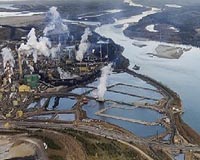 |
Abuja, Nigeria (UPI) Jan 6, 2009 Uncertainty over the health of Nigerian President Umaru Yar'Adua -- hospitalized in Saudi Arabia for more than a month -- and a ferment of political intrigue caused by his absence are stoking fears that a fragile truce in a conflict over the nation's oil wealth will soon unravel altogether. In the southern Niger Delta, the country's oil-producing center, militants who have observed a cease-fire since August for peace talks are reported to be regrouping with fresh demands from the now-leaderless government in Abuja. Since Yar'Adua fell ill with a heart condition Nov. 23, Nigeria's government has been effectively paralyzed. In this worsening power vacuum, critical negotiations with the Movement for the Emancipation of the Niger Delta, the main rebel coalition, have ground to a halt. The main issue for the militants is implementing Yar'Adua's pledge to funnel more of the nation's oil revenues -- billions of dollars -- into the impoverished and neglected delta where most people eke out a living on $1 a day. Another piece of unfinished business is the proposal now before the National Assembly to reform the oil industry, one of the biggest in Africa. It seeks to allow the government to cut out foreign companies from Nigeria's lucrative oil fields and increase the state's share of the profits. "It's pretty serious," said John Campbell, U.S. ambassador in Abuja in 2004-07. "Basically what's happening in Nigeria right now is nothing. The whole situation is on hold." MEND is becoming increasingly restive at the government's failure to address these issues and has warned that it would resort to violence again in 30 days and tear up its cease-fire agreement with the government struck on Oct. 25 if the peace negotiations are not resumed. In December the militants blew up a major oil pipeline operated by Shell and Chevron, their first attack in months, in what was seen as a warning shot. At the same time, troops were deployed in two southern cities to counter street protests by thousands of angry MEND members demanding immediate payment of the $2,000 allowances the government promised to rebels who handed over their weapons. "The militants are feeling used and abandoned," said Akinaka Richard, head of the Grassroots Initiative for Peace and Democracy, a rights organization based in Port Harcourt, the delta's main city. "Their allowances are not being paid and they're blaming their leaders for their woes. Now the former militant leaders are beginning to feel the government wants to turn their boys against them." The five-year conflict in the delta has been costing the state around $1 billion a month in lost oil revenue. Nigeria's oil production has been slashed by 1 million barrels a day from the 2006 level of 2.6 million a day. Output has started to creep back up since the fighting was halted, but renewed hostilities could turn that around very quickly. PFC Energy, a Washington-based oil consultancy, said that "prospects for additional violence and production disruptions remain, with little upside growth in the short term. ... "Should the president pass away, or cave in to demands to resign, a power vacuum will be created with critical implications for the redrawing of the Nigerian political landscape, as well as the potential for resumption of violence in the Niger Delta." Critics of the government claim it is using Yar'Adua's absence as an excuse to stall. The problem is that the president, a chain smoker who has a history of kidney problems and other ailments, has never designated a deputy as the constitution requires. Technically, Vice President Goodluck Jonathan is next in line, but he's a Christian and the Muslim-dominated north is not expected to allow Yar'Adua, a Muslim, to be replaced by a non-Muslim. Jonathan said Jan. 1 that Yar'Adua would "soon" return, but so far there has been no official word on when that might be. Political analysts and lawyers say Nigeria is on the brink of a constitutional crisis. Fifty prominent political figures have issued a petition calling on Yar'Adua to resign if he is medically unfit to run the country. A federal court is scheduled to hold hearings Jan. 14 on three lawsuits aimed at forcing Yar'Adua to transfer power to Jonathan.
Share This Article With Planet Earth
Related Links Powering The World in the 21st Century at Energy-Daily.com
 China buys into Canadian tar sands project
China buys into Canadian tar sands projectOttawa (UPI) Jan 5, 2009 Canada and China have signed a deal that will see PetroChina, the market arm of the state-owned China National Petroleum Corp., investing $1.7 billion in two Canadian tar-sands deposits in Alberta. Canadian Industry Minister Tony Clement said the government gave PetroChina the go-ahead for the acquisition. Industry sources said the deal was agreed about two months ago but only finalized before Clement's announcement before the new year. If successfully exploited, the tar-sands development will secure for China's energy-hungry economy a substantial resource from about 5 billion barrels equivalent of "best case" bitumen. ... read more |
|
| The content herein, unless otherwise known to be public domain, are Copyright 1995-2009 - SpaceDaily. AFP and UPI Wire Stories are copyright Agence France-Presse and United Press International. ESA Portal Reports are copyright European Space Agency. All NASA sourced material is public domain. Additional copyrights may apply in whole or part to other bona fide parties. Advertising does not imply endorsement,agreement or approval of any opinions, statements or information provided by SpaceDaily on any Web page published or hosted by SpaceDaily. Privacy Statement |